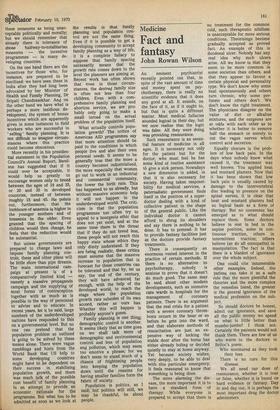Medicine
Fact and fantasy
John Rowan Wilson
An eminent psychiatrist recently pointed out that, in spite of the vast amount of time and money spent on psychotherapy, there is really no scientific evidence that it does any good at all. It sounds, on the face of it, as if it ought to, but that is quite a different matter. Most medical fallacies sounded logical in their day, but we now realise that the logic was false. All they were doing was providing reassurance.
Such reassurance is an essential feature of medicine in all ages. It is necessary not only for the patient but for the doctor, who must feel he has some kind of routine assistance tO give a sick person. Nowadays a new dimension is added, in that it is also necessary for society. Having taken responsibility for medical services, a paternalistic government finds itself in the position of a superdoctor dealing with a kind of collective patient in the shape of the general public. Like the individual doctor it cannot afford to shrug its shoulders and say there is nothing to be done. It has to pretend. It has to provide fantasy facilities just as the doctors provide fantasy treatments.
There is consequently an enormous vested interest in the practice of certain methods. If there is no alternative to psychotherapy, nobody is anxious to prove that it doesn't do much good. The same may be said about other modern developments, such as intensive care wards in hospitals for the management of coronary patients. There is an argument that the real crisis for a patient with a severe coronary thrombosis occurs in the hour or so before he gets into the ward, and that elaborate methods of resuscitation are just an expensive way of locking the stable door after the horse has either already bolted or decided quietly to stay at home anyway. Yet because society wishes, very deeply, to be able to deal with this particular emergency, it feels reassured to know that something is being done.
The more alarming the disease, the more important it is to have a standard form of therapy. While everyone is prepared to accept that there is no treatment for the common cold, such therapeutic nihilism is unacceptable for, more serious conditions. Theorisings become gradually accepted as proved fact. An example of this is duodenal ulcer. Nobody has any real idea why such ulcers arise. All we know is that they seem to be more common in some societies than others, and that they appear to favour a certain physical and personality type. We don't know why some heal spontaneously and others turn chronic, why some perforate and others don't. We don't know the right treatment. The physicians disagree on the value of diet or alkaline mixtures, and the surgeons are at odds with each other as to whether it is better to remove half the stomach or merely to cut the vagus nerves which control acid secretion.
Equally obscure is the problem of low back pain. In the days when nobody knew what caused it, the treatment was well known. You applied heat and mustard plasters. Now that it has been shown that low back pain is usually caused by damage to the intervertebral disc leading to pressure on the spinal nerves, it is clear that heat and mustard plasters had no logical basis as a form of therapy. But no consensus has emerged as to what should replace them. Some doctors believe in rest in bed in the supine position, some in con tinuous traction, others in intermittent traction; others believe (as do all osteopaths) in manipulation. The fact is that there is a blanket of ignorance over the whole subject.
One could cite innumerable other examples. Indeed, the patient can take it as a 'safe rule that the more plentiful the theories and the more complex the remedies listed, the greater is the general ignorance of the medical profession on the subject.
So should doctors be honest, admit our ignorance, and save all the public money we spend on what is little better than mumbo-jumbo? I think not. Certainly the patients would not thank them. There are few of us who warm to the doctors in Belloc's poem: Who murmured as they took their fees There is no cure for this disease.
We all need our dose of reassurance, whether it is true or false, whether it is based on hard evidence or fantasy. Day in and day out, it is perhaps the most important drug the doctor administers.


































 Previous page
Previous page